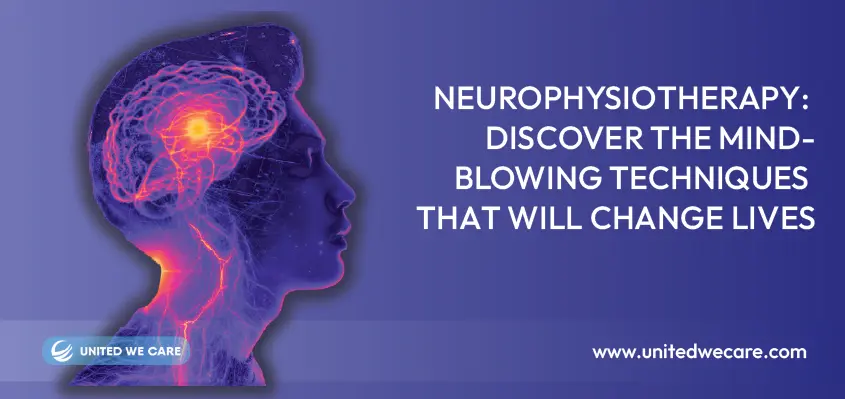Introduction
In recent years, the field of neurophysiotherapy has been making its mark on the world. It is increasing in popularity and is using new techniques to help people who have lost their ability to move due to some neurological condition. However, many people are still unaware of this field and the services it provides. In this article, you will get an overview of this field along with the impact it can have on a person.
What is Neurophysiotherapy?
The meaning is apparent in the name itself. With the focus on two words, “neuro” and “physiotherapy,” you have probably already figured out what this field is about.
Basically, neurophysiotherapy is a specialized branch of physiotherapy that focuses on treating people who suffer from neurological conditions. Most of the time, these conditions include disorders or injuries that affect the brain and spinal cord [1]. In people where the nerves that take messages to muscles or organs are damaged, neurophysiotherapy can be an effective treatment approach. Some examples of these disorders are traumatic brain injury, stroke, spinal cord injury, Parkinson’s disease, multiple sclerosis (MS), etc [1] [2] [3].
When you approach this treatment, the expert takes into consideration your unique needs by assessing how your disease or injury is impacting your function. You might be facing issues with movement, strength, balance, coordination, and various other functions. Once the assessment is done, the expert creates a personalized treatment plan based on the results [1] [2].
Neurophysiotherapy techniques tend to make use of the brain’s neuroplasticity ability. Our brains and the connections in them are not fixed; they keep changing. This ability to change, make new connections, and reorganize is what neuroplasticity is. When you go for treatment with a neurophysiotherapist, they try to prompt the brain to make new connections. They do so by using a number of techniques and technology that target motor control, muscle strength, flexibility, balance, coordination, and functional mobility [1].
What is the Difference Between Neurophysiotherapy and Physiotherapy?
Even though physiotherapy and neurophysiotherapy are fields that focus on improving a person’s physical function when they contract some ailment, there are some differences between the two. Broadly speaking, neurophysiotherapy is a more specialized branch of physiotherapy. Based on this, the differences include [1] [3] [4]:
- The Focus of Intervention: Physiotherapists, in general, treat the muscles and the bones. Their focus is movement and strength, especially when an injury or a disorder is preventing you from functioning fully in your life. On the other hand, the focus of neurophysiotherapists is on the neurological disorders that affect mobility. Since the focus is more on the nervous system and nerves that transmit messages, this is where they use a person’s natural ability of neuroplasticity.
- Specialized Knowledge: The specialization of neurophysiotherapists means that their knowledge about neurological conditions is high and that they have specific training in treating them. They understand the complex processes of the brain and nervous system, along with their disorders and the types of issues that arise with these neurological diseases. Compared to this, physiotherapists have a general understanding of neurological conditions.
- Treatment Plans and Techniques: Since both professionals have different focuses when it comes to treatment, their techniques and plans also differ. Most physiotherapists utilize manual therapy and exercises like moving the joints or applying heat and cold to the affected area. Neurophysiotherapists, on the other hand, not only apply these techniques but also employ specialized techniques where neural networks are a point of focus. These methods involve balance and gait training, electrical stimulation, constraint-mirror therapy, etc.
What are the Benefits of Neurophysiotherapy?
When a person suffers from neurological disorders, their life becomes severely affected. Their relationships suffer, their work suffers, and they are in pain that affects even the basic functions of their lives. Imagine the loss of movement or the ability to balance oneself. The losses are just not limited to the physical body. Since these conditions disrupt the proper transmission of signals between the brain and the body, one can also lose basic functions like perception, speech, memory, cognition, and behavior [5].
In such situations, neurophysiotherapy offers a wide range of benefits. Some of them are [2] [6] [7] :
- Improved Motor Function: One of the main functions of neurophysiotherapy is to help improve motor function or movements in a person. These techniques can help you regain muscle strength and improve your coordination, your balance, and your range of motion. This will eventually help you regain overall control over your movements, and you will be able to perform daily activities more efficiently.
- Enhanced Mobility: Mobility means your ability to move and transport yourself. When a person suffers from neurological conditions, they often experience difficulty walking or moving independently. Neurophysiotherapy can help with this since it focuses on improving gait and balance.
- Pain Management: In many neurological conditions, pain is an irritating accomplice. Pain in muscles, bones, nerves, and, at times, pain in areas that may not exist (especially in cases where amputation has been done, phantom limb pain emerges) can make life hard and unbearable. Neurophysiotherapy techniques can help alleviate pain and greatly improve the life of that person.
- Increased Independence: The overall aim of neurophysiotherapy is to help you become more independent and in control of your condition. All these techniques, which focus on motor skills, balance, and mobility, help you regain independence in tasks such as dressing yourself, bathing, doing daily chores, etc. Neurological conditions take away the freedom a person has, but treatments like these can bring some of the freedom back.
- Improved Quality of Life: When the interventions are successful, the treatment with neurophysiotherapists can help improve your overall quality of life. Mobility increases, pain reduces, and some control of movement is regained. This in itself helps the person function better than they were earlier, and one is able to engage more fully in activities they enjoy.
Conclusion
Neurophysiotherapy is a specialized branch of physiotherapy. These professionals tend to be more trained in the domain of neurological disorders and focus on issues of the nervous system. When someone experiences concerns like stroke or traumatic brain injury, the nerves that are responsible for taking messages from the brain to various organs can get damaged. This means the messages are not transmitted, and organs or muscles do not work. Neurophysiotherapists cater to such individuals and help them regain their function by using various techniques that help the brain rewire.
United We Care is a global mental health platform committed to promoting individuals’ holistic welfare. If you need assistance and support for your mental health, don’t hesitate to contact the experts at United We Care. Our dedicated team is focused on delivering the best solutions for your well-being.
References
- O. Shabir, “What is neurophysiotherapy?,” News, https://www.news-medical.net/health/What-is-Neurophysiotherapy.aspx (accessed Jul. 5, 2023).
- M. Spanakis, I. Xylouri, E. Patelarou, and A. Patelarou, “A literature review of high-tech physiotherapy interventions in the elderly with neurological disorders,” International Journal of Environmental Research and Public Health, vol. 19, no. 15, p. 9233, 2022. doi:10.3390/ijerph19159233
- A. Saeed, “What’s neurological physiotherapy? scope, treatment, exercises,” Healing With PT, https://healingwithpt.com/things-you-should-know/whats-neurological-physiotherapy-scope-treatment-exercises/ (accessed Jul. 5, 2023).
- T. Taverner, “The difference between Neuro Physiotherapy and physiotherapy,” VIM Health, https://vimhealthcare.co.uk/what-is-the-difference-between-neuro-physiotherapy-and-physiotherapy/ (accessed Jul. 5, 2023).
- “Neurological physiotherapy in private practice,” Physiopedia, https://www.physio-pedia.com/Neurological_Physiotherapy_in_Private_Practice (accessed Jul. 5, 2023).
- What is neurological physiotherapy? what are its benefits?, https://lanalifecare.com/neurological-physiotherapy/ (accessed Jul. 5, 2023).
- D. Banning, “What is neurological physiotherapy? what is a neuro physio?,” Body Agility Pty Ltd, https://www.bodyagility.com.au/post/what-is-neurological-physiotherapy-what-is-a-nuero-physio (accessed Jul. 5, 2023).





